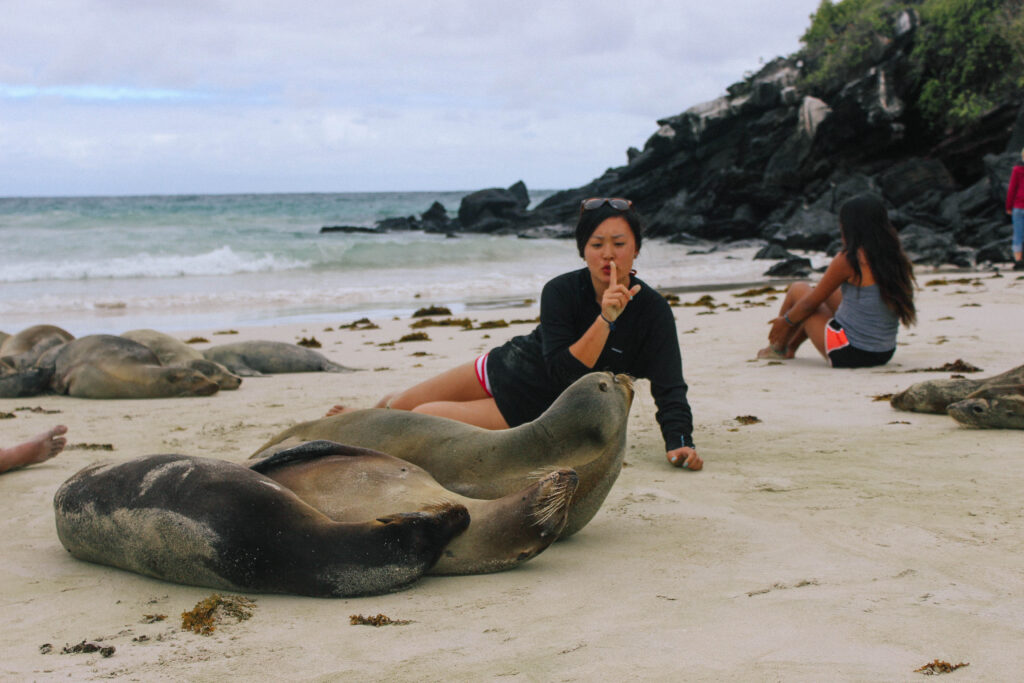Supporting Your Student
Wake Forest University understands that families want to stay informed about program details and preparations that are necessary for a great study away experience. Both the preparations leading up to the study-away program and the program itself are an important part of the student development process and GPS staff are available to support your student at every step.
Here are a few ways you can help your student prepare for studying abroad
- Encourage your student to take ownership of the process before and during their time abroad.
- Provide the occasional friendly reminder to your student to check their email regularly so they have all of the information they need to have a positive experience.
- Ask questions to get a sense of where your student might be in their study abroad preparatory process.
- Supporting your student as they take the lead in their study abroad process will allow your student to grow personally and professionally.


Personalized Advising Services
The Center for Global Programs and Studies assists students with all stages of the study abroad preparation process from selecting a program to preparing for departure. Students are encouraged to schedule an appointment on the appointment page or stop in whenever they have questions or need guidance.
Additionally, students are required to meet with a study abroad advisor at least 2 times before departure: for an introductory advising meeting, and a post-acceptance meeting.
Daily Deac
The Daily Deac is a daily newsletter for parents and families. The Daily Deac offers information about a variety of topics and occasionally covers study abroad.
Why Study Abroad
Study Abroad/Away is a great opportunity for students to grow personally and professionally, experience a new culture, and gain academic credit.
Here are a few reasons why students may choose to study away
- Academics – Study Away programs provide access to courses with experiential learning components (such as visiting historical sites), courses that are not offered on Reynolda Campus (such as wildlife management studies), and different perspectives on a variety of academic disciplines.
- Professional Growth – Many study abroad programs offer internships. Even if students don’t participate in internships, many skills learned in the academic setting and through extra-curricular activities often help students stand out to employers.
- Personal Growth – Studying abroad helps students gain soft skills such as independence, problem-solving, resilience, and cross-cultural engagement.
- Language Immersion – Studying abroad is a great way to practice and improve language skills as it allows students to practice the language outside the classroom in a real-world setting.



Funding Study Abroad
The Center for Global Programs and Studies is committed to ensuring study abroad is accessible to all students. Global Programs staff are available to discuss funding options for study away. Additionally, the Financial Aid Office can advise on how financial aid may be applied to study abroad programs. The Funding Study Abroad page has detailed information about study abroad costs, financial aid, billing, and an FAQ section.
If a student chooses to study on a Wake Forest semester abroad/away program, then they will be billed for
- WFU tuition
- A housing fee
- A meal fee (if applicable)
- Program Fees (summer programs only)
These charges will appear directly on the student’s WFU account. Each program page will have specific information about indirect expenses and anticipated costs.
Short-Term programs include an additional fee for the travel expense of the program which is charged to the WFU student account but there is no additional charge for tuition.
If a student chooses an Affiliate (non-WFU) semester abroad/away program, then they will be billed for
- WFU tuition which is paid to WFU directly. The Wake Forest tuition rate can be found on the WFU’s cost of attendance website.
- Non-tuition fees such as housing which are billed directly by the affiliate program provider. Estimates for fees to be paid to the affiliate provider can be found on the program provider’s website.
This Home School Tuition for Affiliate Programs FAQ covers additional information about the home school tuition model used for affiliate semester study abroad programs.
Students who chose an affiliate summer study abroad programs pay all tuition, housing, and program fees directly to the affiliate program.
All programs typically have indirect costs which are non-billable expenses associated with a program. Indirect costs can include:
- Flights/Transportation
- Visa Fees
- Groceries and Meals – Most programs do not include a meal plan
- Personal Expenses
- Book/Supplies
There are cost of living calculators such as Numbeo that can help you research approximate costs for personal expenses and meals. Additionally, most programs offer itemized cost information with estimated expenses.
Most programs will require a deposit to confirm the student’s participation on the program. Deposits paid to WFU are applied to the tuition cost of the program.
- Deposits are non-refundable
- Deposits are due 2 weeks after acceptance to a study away program.
Study Away billing for semester programs follows the regular Wake Forest University billing cycle for semester programs. Summer tuition charges are added to student accounts on May 1st and are due on June 1st. Summer and Short-Term program fees may be due before tuition charges. More information on tuition and billing can be found on the Student Financial Services webpage.
Study Abroad/Away Disruption Refund Policy
Circumstances may arise during a semester/term that cause significant disruptions to study abroad/away program operations. The Study Abroad/Away Disruption Refund Policy outlines the applicable refunds and the associated refund schedule.
Participation and Withdrawal Policy for Study Abroad/Away
The WFU Participation and Withdrawal Policy for Study Abroad/Away applies to both Wake Forest-sponsored and Affiliate programs.
Passport and Visa Information
Passports
All students studying outside their home country are required to have a valid passport. Your passport must be valid for at least one year after your planned return home. If your passport does not meet this requirement, you must renew it immediately.
GPS recommends students renew their passports early if needed as it can take several months for a passport renewal. Waiting too long to renew a passport may cause delays during the visa process which could impact your student’s ability to study abroad. For more information about the passport application and renewal process, visit the Department of State website or contact your study abroad advisor.
Visas
Most students studying abroad for a semester will be required to obtain a visa before they depart for their program. Learn more about visas on WFU’s Guide to Visas Website.
A visa is an endorsement placed within a passport that allows one to stay in a country longer than if you were traveling solely for tourism. Most semester study abroad and some summer programs require a visa to enter the country.
- Visa requirements are determined by the country where you are planning to study. Wake Forest University does not have control over these requirements.
- The Center for Global Programs or your program provider will send instructions on the visa process and can help answer questions. However, it is the student’s responsibility to obtain their visa before the program.
- Some countries require students to apply for a visa in-person at the Consulate. Consulate locations may include cities outside of North Carolina, so travel may be required.
- Some countries require that students surrender their passport for several weeks while the visa is processing. Depending on the travel dates, there may be certain dates when traveling internationally before the program would make it very difficult to apply for a visa in time for the abroad program.
Until your student has received their passport back with their visa, they are advised to refrain from making international travel plans in the months preceding their study abroad semester. (i.e., If studying abroad in the Fall semester, it may not be possible for any international travel to occur during the months of May – early August)


Health and Safety
The health and safety of students is the top priority on all study abroad programs
- Study abroad/away programs have on-site staff to assist students.
- All programs have 24/7 phone numbers students can contact in case of emergency.
- All students are required to watch the Health & Safety Videos Part I and Part II which include how to stay safe on their program.
- GPS also enrolls students in Crisis24 Horizon, a travel risk management service with a 24/7 phone number (+1-312-894-3199) and a phone app.
- All students are registered for international health insurance either by WFU or their Affiliate program provider.
- For all Wake Forest-administered programs, students will receive coverage through GeoBlue.
- For Affiliate programs, students either receive insurance from their program provider or are enrolled in GeoBlue or iNext, if the program does not include sufficient insurance.
- Visit the health and safety page to learn more.
Contact Us
Our office in Reynolda Hall 116 is open Monday-Friday from 8:30-5:00. During office hours, we can be reached at (336) 758- 5938, or by emailing studyabroad@wfu.edu.
In case of an emergency after normal business hours, contact the WFU Police Department at 336.758.5911 or dispatch@wfu.edu. The Police Department’s phone and email are monitored 24 hours a day, including holidays.

